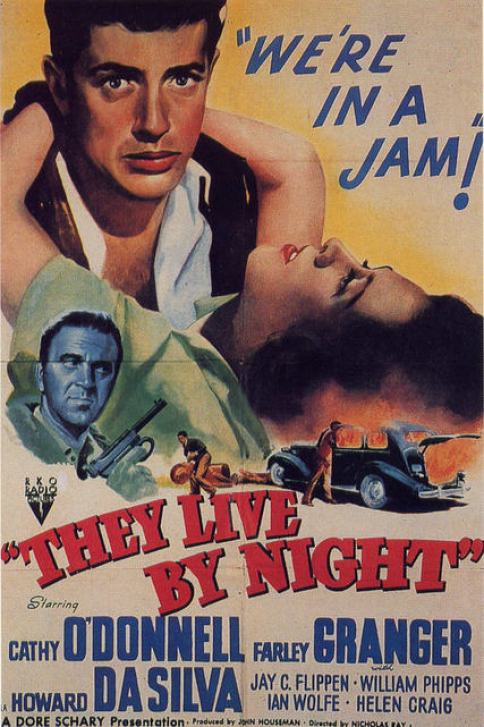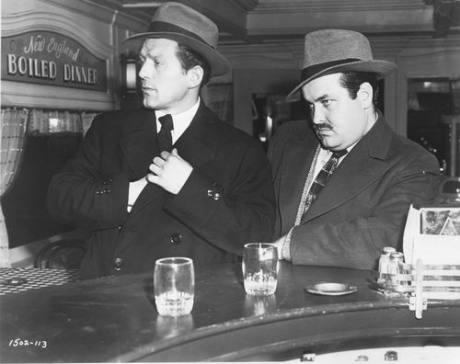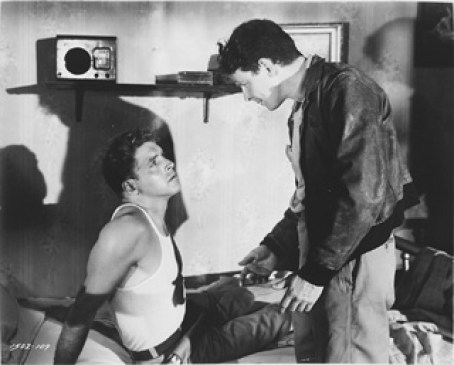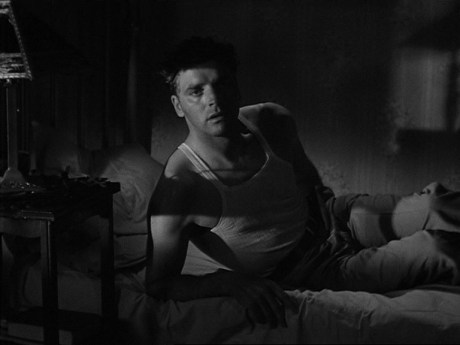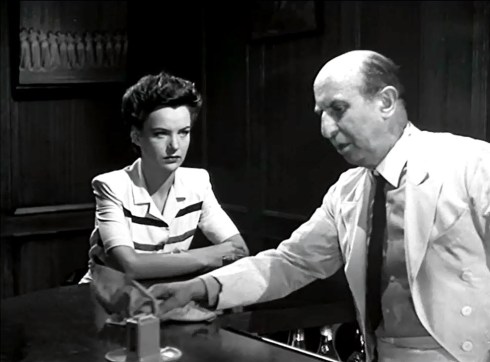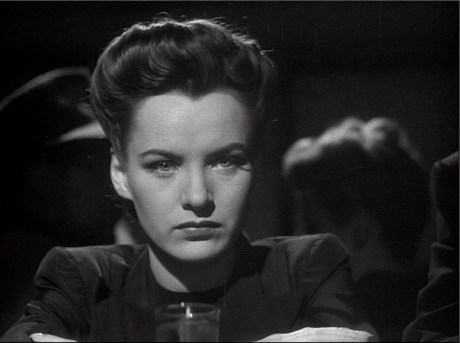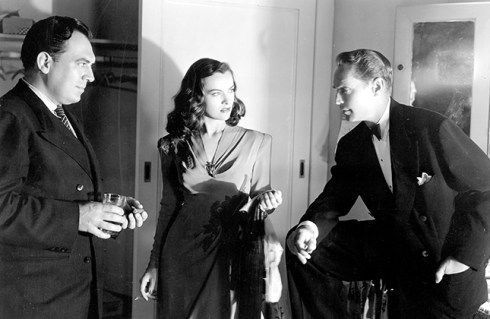They Live By Night (1948) Part One “This boy and girl were never properly introduced to the world”
It’s the first 10 minutes of They Live By Night that sets the stage for our ill-fated lovers. When Keechie comes out to the barn to get water, Bowie follows her, rattles some chains to make noise, and then he slumps down against the wall. When the headlights of a car startle him, he begins to whisper a little ritualistic number-counting verse to himself, a way to calm himself. Perhaps something he picked up in jail. Bowie is 23 years old and spent 7 years of it on the prison farm where he met Chickamaw and T-Dub.
He tells Keechie that he doesn’t really know how to talk to a woman. The old man Mobley shows up in a car with a woman. It’s Mattie, wife of T-Dubs brother still in jail trying to get paroled. Mobley is soused and nearly crashes the car, but smashes some crates and tires and damages the front tire. Mattie gets out complaining about the drive there, and the drunken fool who picked her up. “That’s the best you can send?”
They go into the cabin and leave Bowie and Keechie still in the barn. Keechie asks Bowie if he likes his old man. He says “Not much.” Then Bowie asks if it’s true that her Ma ran off, and she answers yes. He tells her his ma ran off with a guy who ran a pool hall. His Pa used to take him there. He relates to her a story of how one night, there was an argument, but there is usually an argument centered around a game of pool. This time his Pa raised his cue but the other guy had a gun. His Pa turned to him like he was trying to say something, his face went white like he was going to cry. “The blood running into his eyes” Then Ma went to live with the guy who killed him.
Here the backstory lays the groundwork for the couple, who never had a chance to live a normal life, with decent parents who could raise them with a moral code.
She asks why Bowie would run with men like T-Dub and Chickamaw, her uncle “lives for trouble” and is “wild” Bowie keeps a newspaper clipping in his pocket about a guy convicted of murder just like him, who had no due process of the law. The Supreme Court said, “Let that man out!” Bowie fantasizes about running away to Mexico. Dreams are all he has.
This is what Bowie is living for, the day he can afford the Lawyer in Tulsa, who can overturn his conviction and he can get himself “squared around” a significant phrase that will come back at the end of the film. The idea is that these young people are fueled by the desire to belong to the right side of society. Bowie and Keechie start to develop an obvious attraction to each other.
Mattie takes an instant dislike to Bowie and tells Keechie that he’s Jail Bait.

Chickamaw and T-Dub want to pull a big job in Zelton Texas, rob a bank. Bowie agrees to be the driver of the getaway car.
The day before the robbery, we see a large street clock, Bowie looks at it, always asking what time it is. He’s sitting in the car, we hear a train whistle blow. Then Bowie cases the bank. He purchases a beautiful woman’s watch for Keechie at the Zelton Jewelry Store. He doesn’t have smaller bills with him so the jewelry store owner will have to take him over to the bank to break the large bills.
T-Dub and Bowie return to the house where Mattie and Chickamaw are. T-Dub asks Mattie what’s going on. It appears there might be a sexual relationship between the pair. Chickamaw says “How long does a woman wait for one man?” Mattie gets upset “Listen you crumby one-eyed nut” T-Dub goes to slap Mattie but Chickamaw grabs him, and Mattie smashes a mirror. Bowie is spooked and says “That’s 7 years!” is there an emphasis on his superstition because he is uneducated and from a lower class?
On the day of the bank robbery, the same train whistle blows, the clock is standing in the same spot outside the bank, and Bowie is in the car waiting for the two men to give the signal, when the jeweler recognized Bowie and tried to strike up a conversation with him. When Bowie keeps telling him to “get away” and he doesn’t stop talking, Bowie pushed the man to the ground and he hits his head.
All 3 men are in the getaway car now, fleeing the robbery, back on the wide expanses of open land. Blue Grass music is playing on the radio. They pull off the road. Chickamaw pulls out a gas can and sets the robbery car ablaze. The radio starts to die out as the car is consumed by the flames until it sounds like a dying doo hickey.
They drop T-Dub off and Chickamaw says, they can start struttin’ and the one thing Bowie has to learn “is to look and act like other people.” Again we see the emphasis on trying to fit into normal society. They buy fancy clothes and new cars. On the way back to the house, an old jalopy cuts off Bowie and they crash the car. A police officer comes over to question them about how fast they were going and requests that they come along with him, and Chickamaw calls him “friend” and then shoots him.

Chickamaw takes Bowie, who’s sprained his back in the crash, to his brother’s place so Keechie can take care of him. Old man Mobley starts complaining about having to close the station, but Chickamaw says not to worry and shoves a wad of cash in Keechies blouse pocket. Her uncle Chickamaw has a very unhealthy boundary around his niece. He leers at her a good deal of the time and objectifies her, by calling her the girl instead of his niece. When Keechie hands the money over to her father, the old man says, “Girl that’s more money I’ve seen since we collected on that fire we had.” He takes the money, and we know that he’ll blow all of it on booze later on.
Bowie is laying face down on the bed. Keechie takes her hair down and starts brushing it. The first sign that she is embracing her sexuality, her womanhood, amidst this band of dirty thugs, her father included. Bowie awakens and is framed on screen behind a wrought iron bed, that looks like the bars of a jail. Noir characters are often trapped by framing.
Bowie asks Keechie “Who’s your fella…other girls have ’em?” she says “I don’t know what other girls have.” She rubs his back down with something, and the wind in the telephone wires from out the highway, makes an eerie noise outside. Bowie asks if she ever thinks about leaving town, most girls would want to go, again she says “I don’t know what most girls want.” Keechie has been so sheltered from the world. He tells her that he has lots of money now from the robbery, but this offends Keechie. He doesn’t mean to offend her, but she replies, “I’d do this for a dog.” Then he tells her to look in the side pocket of his shirt. She takes out the package and finds the watch he bought for her. She mentions that there is no clock in the cabin, though she wants to set the watch to the right time. Perhaps people who live outside of society have no sense of belonging so need to track the hours of the day. That’s the sense I got from all the references to time and why it was so important for Bowie and Keechie to know what time it was.
He puts the watch on her. She says she never saw any sense in having a fella, then asks him if he’s trying to say that he should be her fella. He says “I guess maybe it is.” This is a very sweet moment for the two of them. She tells him to stay until morning, by then her drunken father will have shot off his mouth all over town, so he’ll need to get away. She’ll go with him.
They leave on a bus. A baby crying incessantly, on a seat next to Bowie, but the mother could care less about quieting the child. They stop for coffee and notice a flashing neon sign Marriages Performed. The waitress pours more coffee and interjects, Hawkins class B, organ music, and everything for $20. She says the way people pop in and out of there you’d think they’re getting dog licenses. At that point, Bowie tries to tell Keechie that he’s no good for her. He’ll always be a black sheep. and she tells him “The only thing black about you is your eyelashes.” She saw the goodness in him from the beginning. After complaining about how awful that wedding place is, he asks her to marry him and they get off the bus, and enter Hawkins, to be married. The old man running the quicky ceremony says to Bowie “You don’t think much about the way I marry people” “I sure don’t” “Me neither but you gotta give people what they want.” Then he sells them a car and heads off for their honeymoon, at Lamberts Inn where they take a room all the way at the end, from Mr Vines and his little son Alvin. They set up a house there. And life seems quiet and “normal” like other people.

In the meantime, old man Mobley goes to the police and tells them about Bowie, kidnapping his daughter. Tells them where they can find him. “That boy belongs in the electric chair, and I’d like to be the one to pull the switch!”
Bowie asks Keechie about “these women who don’t wait for their men” and she gives him her philosophy. “Those women don’t love…woman only loves once. I guess a woman is sort of like a dog, a bad dog would take things from anybody, and he’ll bite anybody who tries to pet him. There was a man back up home, and after he died, his dog wouldn’t eat or do anything, and he died too.”
Chickamaw shows up “Aint you shacked up nice and cozy,” He asks for alcohol, but since there wasn’t any, he asks for candy and starts munching on it. Tells Bowie the newspapers are “plastered with his face.” Every time some dingbat robs a filling station, they say it’s “Bowie the Kid”, the Zelton bandit. “You’d have to have wings to be every place they say you did.”
Chickamaw and T-Dub are out of money and now want to pull another job. ” kid we got a bank in Cedars, just itching to be charged” Bowie offers half his loot from the Zelton robbery but Chickamaw strongarms him into coming along. “you know that’s friendly, real friendly…you aint gonna be handing me out no two bits at a time for ice cream cones, that doe you got where’d you get it?! working the shoe store, it takes 3 to pull a trick and you’re number 3, even if the papers say you’re number one.” T-Dub tells him later on that they took him out of jail over other men. Keechie is furious with Bowie for going along.
After the bank job, Chickamaw is gets righteously riled. T-Dub got killed during the bank robbery. Chickamaw tells Bowie that it “rips his guts out” All the papers do is talk about Bowie the Kid. He wants Bowie to stop for a drink, but Bowie refuses, Chickamaw grabs a pipe from the back seat and tries to hit him with it. Bowie orders him to get out of the car.

Bowie returns home that night to Keechie. “I guess you heard over the radio” “I heard T-Dub’s dead, Chickamaw was killed breaking into a liquor store…they say it runs in threes.”
She tells him she’s going to have a baby, no matter what. Bowie says “That’s right, he’ll have to take his chances just like us.”
They go out for the day and walk around the park like other “real people”, Bowie talks about going to Mexico again. they go out for supper and dancing.


A drunk stumbles into Keechie, so they decide to leave, but Keechie asks Bowie to get her some cigarettes. While in the bathroom getting the pack of cigarettes from the machine, a man crouches behind him and says “Bowie the kid” pulls the gun away from Bowie “Papers say you carry a .45” Bowie comes back “Papers say a lot of things.” The man tells him “We want you to leave town tonight, we don’t want any trigger-happy hillbillies around.”
There are no safe places for Bowie and Keechie to belong. They’re too innocent for the thugs like Chickamaw and T-Dub, yet they’re perceived as hicks by a whole other hierarchy of criminals. They Live By Night really is a story about human suffering and class disparity.

When the couple realizes that the plumber who came to fix the busted pipes in their place has recognized Bowie, they flee their little home and head out for the Prairie Plaza Hotel, a piece of property that Bowie remembers Mattie owns. Mattie is not happy to see Bowie, even though she finds out that Keechie’s ill and pregnant, unknown to the young couple, she turns them in to the police in exchange for her husband finally getting paroled.
Bowie goes back to the man who married them, asking about getting help to flee to Mexico, but the old man tells him that he’s a thief just like Bowie, but he won’t sell him “hope” when there ain’t any. Bowie realizes that there just isn’t a place in the world for “people like us.”
Note: the use of the metaphor of dogs is used a lot in the film– as obedience, faithfulness, and submissiveness. loyalty.
I won’t spoil the climax of They Live By Night, it is a poetic masterpiece of director Nicholas Ray

